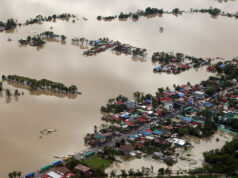China urges ASEAN to reject outside interference
BEIJING urged Southeast Asian nations on Tuesday to unite and “say no” to outside forces seeking to interfere in the South China Sea dispute, in an apparent swipe at the United States ahead of a regional summit.
Chinese Foreign Minister Wang Yi made the statement in Manila where he hailed the “strong momentum” in ties with the Philippines, a longstanding US ally which has moved closer to China under President Rodrigo R. Duterte.
Mr. Wang also paid Mr. Duterte a visit at Malacañang. The visit came a week before he was set to return to Manila for a meeting of foreign ministers from the 10-member Association of Southeast Asian Nations (ASEAN) and its partners, which include China and the United States.
He said warming relations between Beijing and Manila had helped ensure stability in the South China Sea, where rival claims have long made it one of Asia’s potential military flash points.
“The improvement of China-Philippines relations…has played a key role in this process….This fact shows the world that China and ASEAN countries have full capabilities and wisdom to handle differences between us and maintain stability in the South China Sea,” Mr. Wang told reporters.
“If there are still some non-regional forces or forces in the region that don’t want to see stability in the South China Sea and they still want to stir up trouble in the South China Sea, we need to stand together and say no to them together,” he added.
China claims nearly all of the strategically vital sea, even waters approaching the coasts of its neighbors. ASEAN members the Philippines, Vietnam, Malaysia and Brunei, as well as Taiwan, claim parts of the sea.
While the United States is not a claimant and says it takes no sides in the disputes, it has criticized what it has termed Chinese “militarization” of the sea.
Washington has repeatedly sent warships close to Chinese-occupied islands in the sea in recent years, triggering angry responses from Beijing.
Mr. Duterte has downplayed the Philippines’ dispute with China, declining to use a favorable ruling from a UN-backed tribunal last year on the issue to pressure Beijing.
He has said better relations with China, following six years of tension under his predecessor who took a hard line with Beijing over the dispute, will generate billions of dollars in promised Chinese investments and aid.
For his part, Mr. Wang said, in a joint press briefing with his Philippine counterpart, Alan Peter S. Cayetano, “In the first five months of this year, the Philippine export to China grew by 10.7%, (while) China became the largest trading partner of the Philippines.”
Mr. Wang also noted the increase of Philippine fruit exports to China — in contrast to past restrictions amid tensions then over the maritime dispute — and of Chinese tourists to the Philippines. He said that between January and May this year, about “400,000 Chinese tourists visited the Philippines, up by almost 40% on a year-on-year basis.”
“Boracay alone received 170,000 Chinese tourists,” Mr. Wang said of the world famous beach destination in Central Philippines.
Mr. Wang also said that Beijing is due to provide assistance in the building of two bridges along the Pasig River, apart from Chinese involvement in the North-South Railway project, and the Kaliwa Dam and Chico River irrigation projects.
Apart from infrastructure, trade and tourism, China has also promised assistance to Filipino fishermen particularly those in Palawan. “In the near future, China will provide 100,000 young groupers… to the fishermen of Palawan… and there is a series of cooperation, initiatives and ideas being discussed, including the support of Philippine rice farming, deep water and aqua culture and processing of aqua products,” Mr. Wang said.
Among the critical issues that had been raised concerning the maritime dispute is the restriction to Filipino fishermen of access to fish and other food resources in the disputed waters.
Mr. Wang also pledged 20 million renminbi ($3 million) to help rehabilitate the war-torn southern Philippine city of Marawi, where a US-backed military offensive is seeking to flush out pro-Islamic State group militants.
On Tuesday, Messrs. Wang and Cayetano signed a memorandum of understanding on enhancing ties between the two nations on several areas, including trade and investments.
Mr. Cayetano, for his part, invited Mr. Wang to return to the Philippines in August for the ASEAN meetings in Manila.
Sought for comment on Mr. Wang’s Manila visit, foreign policy analyst Richard J. Heydarian said: “I think it is necessary to reach out to China,…to engage in institutional dialogue and more importantly we need to engage them….But by no means we should seek peace on China’s terms.”
Mr. Heydarian noted that “Philippine foreign affairs are increasingly sounding like (the) Chinese counterparts….” — AFP with Mario M. Banzon



